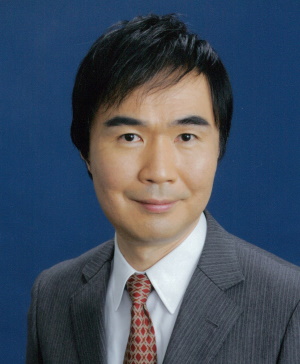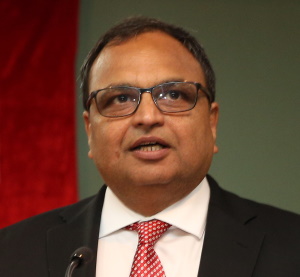Keynote
Keynote 1
Day 1 (Sep. 15) 8:10-9:00 (JST)

Prof. Satoshi Matsuoka
Director RIKEN Center for Computational Science (R-CCS)
Professor, Dept. Mathematical and Computing Sciences, Tokyo Institute of Technology
Presentation slide
Abstract
Fugaku is the first `exascale’ supercomputer of the world, not due to its peak double precision flops, but rather, its demonstrated performance in real applications that were expected of exascale machines on their conceptions 10 years ago, as well as reaching actual exaflops in new breed of benchmarks such as HPL-AI. But the importance of Fugaku is "applications first" philosophy under which it was developed, and its resulting mission to be the centerpiece for rapid realization of the so-called Japanese `Society 5.0' as defined by the Japanese S&T national policy. As such, Fugaku’s immense power is directly applicable not only to traditional scientific simulation applications, but can be a target of Society 5.0 applications that encompasses conversion of HPC & AI & Big Data as well as Cyber (IDC & Network) vs. Physical (IoT) space, with immediate societal impact. In fact, Fugaku is already in partial operation a year ahead of schedule, primarily to obtain early Society 5.0 results including combatting COVID-19 as well as resolving other important societal issues.
Biography
Satoshi Matsuoka from April 2018 has become the director of Riken CCS, the top-tier HPC center that represents HPC in Japan, developing and hosting Japan’s tier-one ‘Fugaku’ supercomputer which has become the fastest supercomputer in the world in all four major supercomputer rankings, along with multitudes of ongoing cutting edge HPC research being conducted, including investigating Post-Moore era computing. He was the leader of the TSUBAME series of supercomputers, at Tokyo Institute of Technology, where he still holds a Professor position, to continue his research activities in HPC as well as scalable Big Data and AI. His commendations include the ACM Gordon Bell Prize in 2011 and the IEEE Sidney Fernbach Award in 2014, both being one of the highest awards in the field of HPC, as well as being the Program Chair for ACM/IEEE Supercomputing 2013 (SC13).
Keynote 2
Day 2 (Sep. 16) 14:00-14:50 (JST)

Prof. Felix Wolf
Technical University of Darmstadt
Presentation slide
Abstract
To understand the scaling behavior of HPC applications, developers often use performance models. A performance model is a formula that expresses a key performance metric, such as runtime, as a function of one or more execution parameters, such as core count and input size. Performance models offer quick insights on a very high level of abstraction, including predictions of future behavior. In view of the complexity of today’s applications, which often combine several sophisticated algorithms, creating performance models manually is extremely laborious. Empirical performance modeling, the process of learning such models from performance data, offers a convenient alternative, but comes with its own set of challenges. The two most prominent ones are noise and the cost of the experiments needed to generate the underlying data. In this talk, we will review the state of the art in empirical performance modeling and investigate how we can employ machine learning and other strategies to improve the quality and lower the cost of the resulting models.
Biography
Felix Wolf is full professor at the Department of Computer Science of Technical University of Darmstadt in Germany, where he leads the Laboratory for Parallel Programming. He works on methods, tools, and algorithms that support the development and deployment of parallel software systems in various stages of their life cycle. Wolf received his Ph.D. degree from RWTH Aachen University in 2003. After working more than two years as a postdoc at the Innovative Computing Laboratory of the University of Tennessee, he was appointed research group leader at Jülich Supercomputing Centre. Between 2009 and 2015, he was head of the Laboratory for Parallel Programming at the German Research School for Simulation Sciences in Aachen and full professor at RWTH Aachen University. Wolf has made major contributions to several open-source performance tools for parallel programs, including Scalasca, Score-P, and Extra-P. Moreover, he has initiated the Virtual Institute High Productivity Supercomputing, an international initiative of HPC programming-tool builders aimed at the enhancement, integration, and deployment of their products. He has published more than a hundred refereed articles on parallel computing, several of which have received awards.
Keynote 3
Day 3 (Sep. 17) 8:00-8:50 (JST)

Prof. Alok N. Choudhary
Henry & Isabelle Dever Professor of ECE, Northwestern University
Founder, Chairman and Chief Scientist, 4Cinsights Inc.
Presentation slide
Abstract
"AI for Science" seeks to understand, explore and develop Machine Learning and Data Mining approaches for accelerating scientific discoveries as well as designs. An example of this is learning from data to build predictive models that can enable exploration of scientific questions without relying upon underlying theory. Given that modern instruments, supercomputing simulations, experiments, sensors and IoT are creating massive amounts of data at an astonishing speed and diversity, AI for Science has the potential to accelerate science discoveries by orders of magnitude. Another example is the acceleration of so called the "inverse problems" which explore the design space based on desired properties. This talk presents examples, possibilities and limitations of "AI for Science".
Biography
Dr. Alok Choudhary is the Dever Professor of Electrical Engineering and Computer Science at Northwestern University. He also teaches at Kellogg School of management. He is the founder, chairman and chief scientist of 4C insights, a big data analytics and marketing technology software company (4C was recently acquired by MediaOcean). He received the National Science Foundation’s Young Investigator Award in 1993. He is a fellow of IEEE, ACM and AAAS. He was listed by Adweek in " trailblazers and pioneers in Marketing technologies" and Dr. Choudhary was also awarded with the "Technology Manager of The Year in Chicago" in 2018. Prof. Choudhary received the first award for “Excellence in Research, Teaching and Service” from the McCormick School of Engineering.
His research interests are in high-performance computing, ML/AI and scalable data mining (and their applications in science, medicine and business), and high-performance I/O systems. Alok Choudhary has published more than 400 papers in various journals and conferences and has graduated 45+ PhD students, including more than 10 women PhDs (one of the highest in the world). He serves on the board of several companies. He serves on National academies of Science roundtable to develop and recommend post-secondary data science education strategies. Dr. Choudhary currently serves on the U.S. Secretary of Energy’s Advisory Board on Artificial Intelligence.
